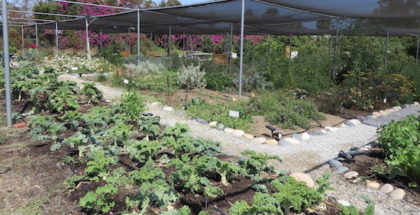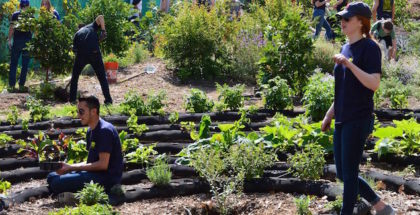Master Gardener Program Grows Food and Community Across L.A. County
December 12, 2016 | Charli Engelhorn
Since University of California Cooperative Extension established the first Master Gardener Programs in the state in 1981, its army of certified volunteer gardeners, who are today spread across more than 50 counties, have supported programs aimed at educating California residents, especially those living in low-income communities, about growing their own food.
In Los Angeles, one such program that Master Gardener Program volunteers supported was the Common Ground Garden Program, which was established in 1976 with funds from a Congressional appropriations bill to support a national Urban Garden Program. Working in collaboration with the Common Ground Garden Program, the Master Gardener volunteers played a pivotal role in helping to set up several community and school gardens across the county.
After funding from the Urban Garden Program ceased, the Los Angeles County branch of the Master Gardener Program formally took over the task of training community gardeners.
“Our overall mission is to teach California residents science-based information about sustainable gardening practices,” says Rachel Surls, sustainable food systems advisor for the Cooperative Extension Los Angeles County and one of the contacts for the Master Gardener Program. “The focus is on non-commercial gardening—home and community gardeners.”
Since 1993, the Los Angeles County Master Gardener Program has trained 1,233 Master Gardener volunteers.
At the heart of the Los Angeles County curriculum is the goal of teaching people to grow food, but the knowledge and skills gained by program participants often lead to greater impacts in local communities. Master Gardener volunteer efforts in communities can result in more productive gardens, implementation of sustainable water use practices, and the creation of effective and well organized school and community gardens. In communities experiencing food insecurity, or poor access to healthy foods, the education and support that Master Gardeners bring to their gardens have the potential to positively impact the lives of the residents. According to Surls, the focus on social justice is a continuation of the history of the founding program and something she is proud of.
“Although our mission has broadened to include non-edible gardening, helping to empower underserved communities to grow their own food is still a strong focus,” Surls says. “We do this through partnerships with other organizations.”
One such program is Pacoima, CA-based MEND (Meet Each Need with Dignity), whose mission is to “break the bonds of poverty by providing basic human needs and a pathway to self-reliance.” Members of the MEND staff have taken part in the Master Gardener Program and help organize educational training sessions in communities where gardens can make a difference, according to Surls.
Cynthia Hubach, a Master Gardener and the founder of the Elysian Valley Community Garden, has seen first-hand the difference a community garden can make for residents.
“EV (Elysian Valley) is in the midst of a development boom that has created tension among the residents and the newcomers. The garden is a place where people can come together and get to know one another,” Hubach said. “In this neighborhood, where there is lot of diversity, people are learning about different types of plants and methods for growing. The community gardeners really share their knowledge with each other.”
Hubach left her job as a TV producer to go back to school and earn a master’s degree in urban sustainability at Antioch University. In possession of a vacant lot, she wanted to start a community garden for the neighboring residents. With help from the LA Community Garden Council and eager community members, Hubach set up and began operating her community garden. Shortly thereafter, she joined the Master Gardener Program to learn more about actual gardening.
“The program is a lot of book work. You learn mostly about botany and get in deep with how plants work, how the seeds work, and irrigation,” Hubach says. “However, more than the physical elements of gardening, the program puts an emphasis on people who will make a contribution to the community, who will take the information gained and disseminate it to the most people, and who will create the greatest benefit.
“The greatest benefit for me was becoming immersed in a community of people who really want to engage with food access and urban agriculture,” she says.
Other Master Gardeners have started community gardens, including Florence Nishida, who co-founded LA Green Grounds with Vanessa Voblis and Ron Finley, a graduate of the Grow LA Victory Garden Initiative. The Grow LA Initiative is a project that was started in 2010 as a response to the growing public interest in edible gardening. The initiative is a four-week mini-Master Gardener course to teach the basics of growing vegetables, with sessions held in churches, community gardens, and schools, according to Surls. After the four sessions, led by Master Gardener volunteers, the participants become certified UC Victory Gardeners. The members of Farm LA, a non-profit organization working to turn vacant lots into gardens, are also Victory Gardeners.
Since its inception, the Grow LA Victory Garden Initiative has trained 2,740 Victory Gardeners at 185 garden locations. More than 300 Master Gardener volunteers taught those classes, which is a major requirement for those wishing to obtain and maintain Master Gardener certification. In fact, Master Gardeners must complete 50 hours of volunteer service their first year and 25 hours each subsequent year, as well as 12 hours of continuing education annually. According to Surls, the volunteer hours only count if the activity includes an educational component.
“In the most recent program year, 277 Master Gardeners logged 17,524 volunteer hours, helping 119,789 Los Angeles County residents to garden more sustainably,” Surls says. Those hours included work at 96 community gardens, 127 school gardens, 10 senior gardens, 8 shelter gardens, and 70 fairs and farmers’ markets.
Whereas the Victory Garden Initiative meets twice a year for four weeks, the Master Gardener Program meets every Saturday for 13 weeks between February and May. Of the 100-200 applications received, only 50 participants are chosen for the Los Angeles County division. Information about the application process for Los Angeles County or other counties throughout California can be found online. Applications must be submitted by January 9, 2017.
This post originally appeared on Seedstock.com: http://seedstock.com/2016/11/29/master-gardeners-across-l-a-use-skills-and-training-to-grow-food-and-community/












Submit a Comment